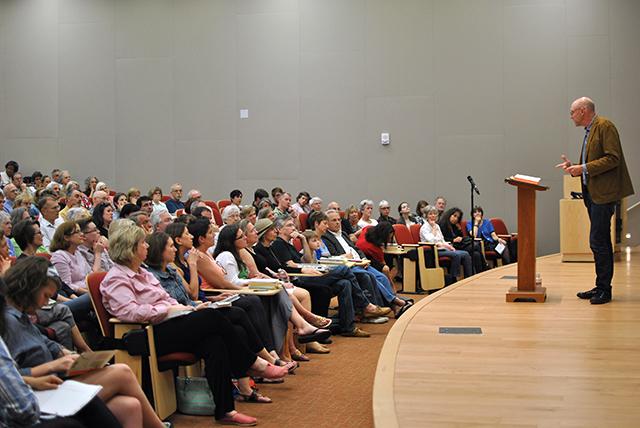The most important marker of a healthy diet is whether the food it is made up of is cooked by people or a corporation, according to Michael Pollan, a food advocate and best-selling author.
Pollan spoke at the Hunt Library Friday evening about his most recent book, “Cooked.”
People are shifting away from making home-cooked meals, and are instead eating more food processed by large corporations, Pollan said.
Pollan said food corporations grew when they saw the chance to relieve the tension of who will cook when women started working and the norm of them being a homemaker changed. Advertising started being geared toward families as a quick, easy meal for working women.
Pollan spoke about the cultural impact of food and how it needs to be preserved. Pollan also spoke about the importance of food sustainability.
“Food is culture,” Pollan said. “We forget that at our peril.”
That’s why for his book, he learned how to make Eastern -style barbecue from “The Pitmaster,” Ed Mitchell, the owner of The Pit, a barbecue restaurant in Wilson, N.C.
Pollan said cooking meat used to be a communal and more “sacred” process, but now most people don’t know where their meat is from or how the livestock was treated and processed.
Pollan talked about how the key component to Mitchell’s barbecue is where his meat comes from and how it was raised to ensure he has high-quality meat.
The process of cooking barbecue preserves the traditions of cooking because it is a social event people enjoy, Pollan said.
“Michael was again exceptional in advocating for what I believe in, which is sustainable farming,” Mitchell said.
In his talk, Pollan about how cooking is often considered a chore. He said the problem is often the responsibility of cooking is dumped on one person, which makes it less appealing than cooking socially with a group.
“We need to share the responsibility of cooking,” Pollan said. “We need to get kids in the kitchen or we’re being irresponsible.”
Pollan said Americans need to build a “less sexist culture” of cooking by getting more family members cooking in households.
Home economics should be part of school curriculum again and good habits need to be formed so food quality and production will improve, according to Pollan.
“Pollan not only affirmed many things that I have already learned in my classes, but it also encouraged me to dig deeper into the many facets within my field of study,” said Sean Whitfield, a senior in food science.








